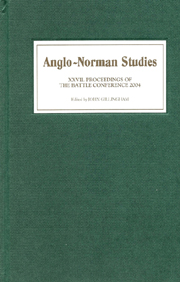Book contents
- Frontmatter
- Contents
- LIST OF ILLUSTRATIONS
- EDITOR'S PREFACE
- ABBREVIATIONS
- Probing the Passions of a Norman on Crusade: the Gesta Francorum et aliorum Hierosolimitanorum
- Gilbert Foliot et l'Ecriture, un exégète en politique
- Writing Warfare, Lordship and History: the Gesta Consulum Andegavorum's Account of the Battle of Alençon
- Anglo-French Peace Conferences in the Twelfth Century
- Peter of Blois and the Problem of the ‘Court’ in the Late Twelfth Century
- Normandy and Norman Identity in Southern Italian Chronicles
- Monastic Chronicles in the Twelfth-Century Abruzzi
- The Impact of Rebellion on Little Domesday
- Setting Things Straight: Law, Justice and Ethics in the Orationes of Lawrence of Durham
- The Angevin Kings and Canon Law: Episcopal Elections and the Loss of Normandy
- Zooarchaeology of the Norman Conquest
- Was Thomas Becket Chaste? Understanding Episodes in the Becket Lives
Was Thomas Becket Chaste? Understanding Episodes in the Becket Lives
Published online by Cambridge University Press: 12 September 2012
- Frontmatter
- Contents
- LIST OF ILLUSTRATIONS
- EDITOR'S PREFACE
- ABBREVIATIONS
- Probing the Passions of a Norman on Crusade: the Gesta Francorum et aliorum Hierosolimitanorum
- Gilbert Foliot et l'Ecriture, un exégète en politique
- Writing Warfare, Lordship and History: the Gesta Consulum Andegavorum's Account of the Battle of Alençon
- Anglo-French Peace Conferences in the Twelfth Century
- Peter of Blois and the Problem of the ‘Court’ in the Late Twelfth Century
- Normandy and Norman Identity in Southern Italian Chronicles
- Monastic Chronicles in the Twelfth-Century Abruzzi
- The Impact of Rebellion on Little Domesday
- Setting Things Straight: Law, Justice and Ethics in the Orationes of Lawrence of Durham
- The Angevin Kings and Canon Law: Episcopal Elections and the Loss of Normandy
- Zooarchaeology of the Norman Conquest
- Was Thomas Becket Chaste? Understanding Episodes in the Becket Lives
Summary
Who was Thomas Becket? Many learned scholars have asked this question. What were his thoughts and convictions, what made him act the way he did? Was he a staunch defender of ecclesiastical rights against the encroachments of an imperious king? Was he convinced that canon law left him with no other choice? He certainly claimed to be speaking for the whole English Church, but on the way he somehow lost his fellow bishops. Was he just a very unpleasant person? But if so, why did the king not notice that when he was chancellor? Did he undergo a dramatic change of personality after having been made archbishop? Did he dissimulate his true character while chancellor? The question of Becket's character is an ever-present issue when scholars try to come to terms with his actions as archbishop. Much hinges on the perception of Becket as chancellor and on his transition from chancellor to archbishop.
A few years ago it was argued that the Lives don't support the view that Thomas Becket underwent a radical change on becoming archbishop. Obviously all the Lives are emphatically pro-Becket – otherwise they would not have been written – and they, it is argued, present a consistent picture of sanctity from birth to death, building their arguments on the dichotomy of outward wordliness and inner spirituality. In their view Becket always was and always remained his own pious self.
- Type
- Chapter
- Information
- Anglo-Norman Studies 27Proceedings of the Battle Conference 2004, pp. 198 - 209Publisher: Boydell & BrewerPrint publication year: 2005

